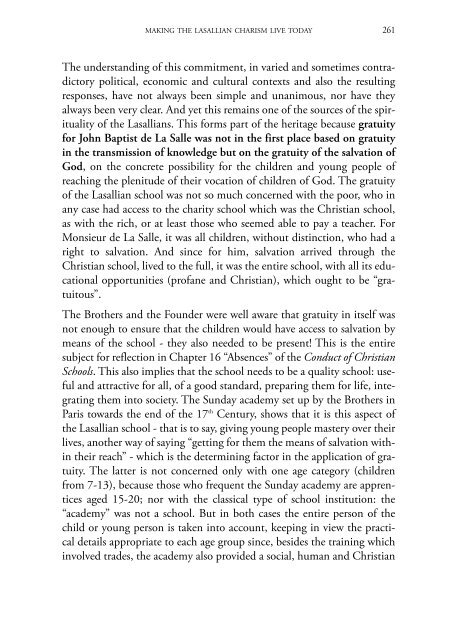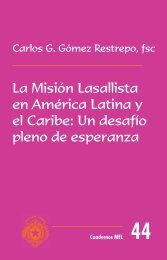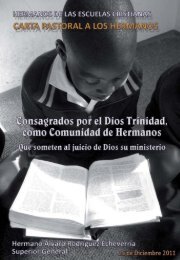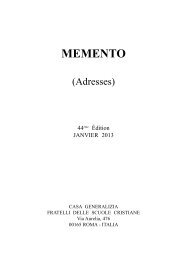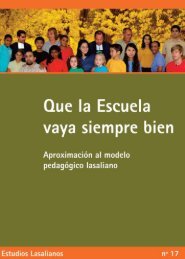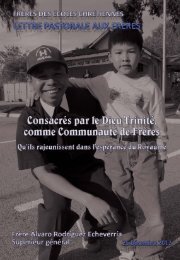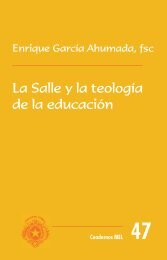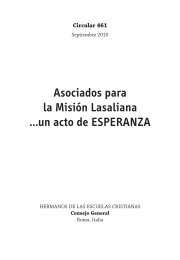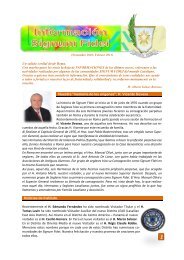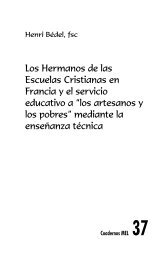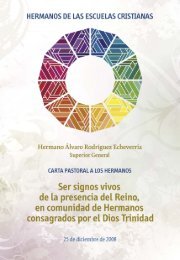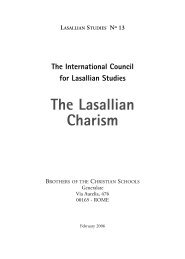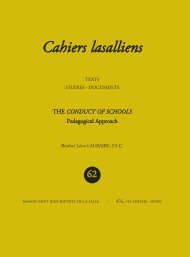- Page 1 and 2:
LASALLIAN STUDIES Nº 13 The Intern
- Page 3 and 4:
TABLE OF CONTENTS Table of contents
- Page 5 and 6:
INTRODUCTION 5 Introduction The Int
- Page 7 and 8:
I. CHARISM - ITS SEMANTIC FIELD 7 I
- Page 9 and 10:
I. CHARISM - ITS SEMANTIC FIELD 9
- Page 11 and 12:
II. CHARISM IN THE BIBLE 11 II. Cha
- Page 13 and 14:
II. CHARISM IN THE BIBLE 13 charism
- Page 15 and 16:
II. CHARISM IN THE BIBLE 15 So he i
- Page 17 and 18:
II. CHARISM IN THE BIBLE 17 iours o
- Page 19 and 20:
II. CHARISM IN THE BIBLE 19 The cha
- Page 21 and 22:
II. CHARISM IN THE BIBLE 21 Other a
- Page 23 and 24:
II. CHARISM IN THE BIBLE 23 7. Char
- Page 25 and 26:
II. CHARISM IN THE BIBLE 25 1. Blin
- Page 27 and 28:
II. CHARISM IN THE BIBLE 27 4. To b
- Page 29 and 30:
II. CHARISM IN THE BIBLE 29 (cf. 1
- Page 31 and 32:
III. CHARISM IN THE CHURCH 31 III.
- Page 33 and 34:
III. CHARISM IN THE CHURCH 33 The w
- Page 35 and 36:
III. CHARISM IN THE CHURCH 35 The C
- Page 37 and 38:
III. CHARISM IN THE CHURCH 37 ards
- Page 39 and 40:
III. CHARISM IN THE CHURCH 39 The c
- Page 41 and 42:
III. CHARISM IN THE CHURCH 41 Relig
- Page 43 and 44:
III. CHARISM IN THE CHURCH 43 Wheth
- Page 45 and 46:
III. CHARISM IN THE CHURCH 45 [The
- Page 47 and 48:
III. CHARISM IN THE CHURCH 47 form
- Page 49 and 50:
IV. DISCOVERING, LIVING, SHARING TH
- Page 51 and 52:
IV. DISCOVERING, LIVING, SHARING TH
- Page 53 and 54:
IV. DISCOVERING, LIVING, SHARING TH
- Page 55 and 56:
IV. DISCOVERING, LIVING, SHARING TH
- Page 57 and 58:
IV. DISCOVERING, LIVING, SHARING TH
- Page 59 and 60:
IV. DISCOVERING, LIVING, SHARING TH
- Page 61 and 62:
IV. DISCOVERING, LIVING, SHARING TH
- Page 63 and 64:
IV. DISCOVERING, LIVING, SHARING TH
- Page 65 and 66:
IV. DISCOVERING, LIVING, SHARING TH
- Page 67 and 68:
IV. DISCOVERING, LIVING, SHARING TH
- Page 69 and 70:
IV. DISCOVERING, LIVING, SHARING TH
- Page 71 and 72:
IV. DISCOVERING, LIVING, SHARING TH
- Page 73 and 74:
IV. DISCOVERING, LIVING, SHARING TH
- Page 75 and 76:
IV. DISCOVERING, LIVING, SHARING TH
- Page 77 and 78:
IV. DISCOVERING, LIVING, SHARING TH
- Page 79 and 80:
IV. DISCOVERING, LIVING, SHARING TH
- Page 81 and 82:
IV. DISCOVERING, LIVING, SHARING TH
- Page 83 and 84:
IV. DISCOVERING, LIVING, SHARING TH
- Page 85 and 86:
IV. DISCOVERING, LIVING, SHARING TH
- Page 87 and 88:
IV. DISCOVERING, LIVING, SHARING TH
- Page 89 and 90:
IV. DISCOVERING, LIVING, SHARING TH
- Page 91 and 92:
IV. DISCOVERING, LIVING, SHARING TH
- Page 93 and 94:
IV. DISCOVERING, LIVING, SHARING TH
- Page 95 and 96:
IV. DISCOVERING, LIVING, SHARING TH
- Page 97 and 98:
IV. DISCOVERING, LIVING, SHARING TH
- Page 99 and 100:
IV. DISCOVERING, LIVING, SHARING TH
- Page 101 and 102:
IV. DISCOVERING, LIVING, SHARING TH
- Page 103 and 104:
IV. DISCOVERING, LIVING, SHARING TH
- Page 105 and 106:
IV. DISCOVERING, LIVING, SHARING TH
- Page 107 and 108:
IV. DISCOVERING, LIVING, SHARING TH
- Page 109 and 110:
IV. DISCOVERING, LIVING, SHARING TH
- Page 111 and 112:
IV. DISCOVERING, LIVING, SHARING TH
- Page 113 and 114:
IV. DISCOVERING, LIVING, SHARING TH
- Page 115 and 116:
IV. DISCOVERING, LIVING, SHARING TH
- Page 117 and 118:
IV. DISCOVERING, LIVING, SHARING TH
- Page 119 and 120:
IV. DISCOVERING, LIVING, SHARING TH
- Page 121 and 122:
IV. DISCOVERING, LIVING, SHARING TH
- Page 123 and 124:
IV. DISCOVERING, LIVING, SHARING TH
- Page 125 and 126:
IV. DISCOVERING, LIVING, SHARING TH
- Page 127 and 128:
IV. DISCOVERING, LIVING, SHARING TH
- Page 129 and 130:
IV. DISCOVERING, LIVING, SHARING TH
- Page 131 and 132:
IV. DISCOVERING, LIVING, SHARING TH
- Page 133 and 134:
IV. DISCOVERING, LIVING, SHARING TH
- Page 135 and 136:
IV. DISCOVERING, LIVING, SHARING TH
- Page 137 and 138:
IV. DISCOVERING, LIVING, SHARING TH
- Page 139 and 140:
IV. DISCOVERING, LIVING, SHARING TH
- Page 141 and 142:
IV. DISCOVERING, LIVING, SHARING TH
- Page 143 and 144:
IV. DISCOVERING, LIVING, SHARING TH
- Page 145 and 146:
IV. DISCOVERING, LIVING, SHARING TH
- Page 147 and 148:
IV. DISCOVERING, LIVING, SHARING TH
- Page 149 and 150:
IV. DISCOVERING, LIVING, SHARING TH
- Page 151 and 152:
IV. DISCOVERING, LIVING, SHARING TH
- Page 153 and 154:
IV. DISCOVERING, LIVING, SHARING TH
- Page 155 and 156:
IV. DISCOVERING, LIVING, SHARING TH
- Page 157 and 158:
IV. DISCOVERING, LIVING, SHARING TH
- Page 159 and 160:
IV. DISCOVERING, LIVING, SHARING TH
- Page 161 and 162:
IV. DISCOVERING, LIVING, SHARING TH
- Page 163 and 164:
IV. DISCOVERING, LIVING, SHARING TH
- Page 165 and 166:
IV. DISCOVERING, LIVING, SHARING TH
- Page 167 and 168:
IV. DISCOVERING, LIVING, SHARING TH
- Page 169 and 170:
IV. DISCOVERING, LIVING, SHARING TH
- Page 171 and 172:
IV. DISCOVERING, LIVING, SHARING TH
- Page 173 and 174:
IV. DISCOVERING, LIVING, SHARING TH
- Page 175 and 176:
IV. DISCOVERING, LIVING, SHARING TH
- Page 177 and 178:
IV. DISCOVERING, LIVING, SHARING TH
- Page 179 and 180:
IV. DISCOVERING, LIVING, SHARING TH
- Page 181 and 182:
V. CHARISM IN THE RECENT INSTITUTE
- Page 183 and 184:
V. CHARISM IN THE RECENT INSTITUTE
- Page 185 and 186:
V. CHARISM IN THE RECENT INSTITUTE
- Page 187 and 188:
V. CHARISM IN THE RECENT INSTITUTE
- Page 189 and 190:
V. CHARISM IN THE RECENT INSTITUTE
- Page 191 and 192:
V. CHARISM IN THE RECENT INSTITUTE
- Page 193 and 194:
V. CHARISM IN THE RECENT INSTITUTE
- Page 195 and 196:
VI. EIGHT TESTIMONIES FROM LASALLIA
- Page 197 and 198:
VI. EIGHT TESTIMONIES FROM LASALLIA
- Page 199 and 200:
VI. EIGHT TESTIMONIES FROM LASALLIA
- Page 201 and 202:
VI. EIGHT TESTIMONIES FROM LASALLIA
- Page 203 and 204:
VI. EIGHT TESTIMONIES FROM LASALLIA
- Page 205 and 206:
VI. EIGHT TESTIMONIES FROM LASALLIA
- Page 207 and 208:
VI. EIGHT TESTIMONIES FROM LASALLIA
- Page 209 and 210: VI. EIGHT TESTIMONIES FROM LASALLIA
- Page 211 and 212: VI. EIGHT TESTIMONIES FROM LASALLIA
- Page 213 and 214: VI. EIGHT TESTIMONIES FROM LASALLIA
- Page 215 and 216: VI. EIGHT TESTIMONIES FROM LASALLIA
- Page 217 and 218: VI. EIGHT TESTIMONIES FROM LASALLIA
- Page 219 and 220: VI. EIGHT TESTIMONIES FROM LASALLIA
- Page 221 and 222: VI. EIGHT TESTIMONIES FROM LASALLIA
- Page 223 and 224: VI. EIGHT TESTIMONIES FROM LASALLIA
- Page 225 and 226: VI. EIGHT TESTIMONIES FROM LASALLIA
- Page 227 and 228: VI. EIGHT TESTIMONIES FROM LASALLIA
- Page 229 and 230: VI. EIGHT TESTIMONIES FROM LASALLIA
- Page 231 and 232: VI. EIGHT TESTIMONIES FROM LASALLIA
- Page 233 and 234: MAKING THE LASALLIAN CHARISM LIVE T
- Page 235 and 236: MAKING THE LASALLIAN CHARISM LIVE T
- Page 237 and 238: MAKING THE LASALLIAN CHARISM LIVE T
- Page 239 and 240: MAKING THE LASALLIAN CHARISM LIVE T
- Page 241 and 242: MAKING THE LASALLIAN CHARISM LIVE T
- Page 243 and 244: MAKING THE LASALLIAN CHARISM LIVE T
- Page 245 and 246: MAKING THE LASALLIAN CHARISM LIVE T
- Page 247 and 248: MAKING THE LASALLIAN CHARISM LIVE T
- Page 249 and 250: MAKING THE LASALLIAN CHARISM LIVE T
- Page 251 and 252: MAKING THE LASALLIAN CHARISM LIVE T
- Page 253 and 254: MAKING THE LASALLIAN CHARISM LIVE T
- Page 255 and 256: MAKING THE LASALLIAN CHARISM LIVE T
- Page 257 and 258: MAKING THE LASALLIAN CHARISM LIVE T
- Page 259: MAKING THE LASALLIAN CHARISM LIVE T
- Page 263 and 264: MAKING THE LASALLIAN CHARISM LIVE T
- Page 265 and 266: BIBLIOGRAPHY 265 Bibliography ABERB
- Page 267 and 268: LISTS OF PUBLICATIONS 267 Lists of
- Page 269 and 270: LISTS OF PUBLICATIONS 269 Cahiers L
- Page 271 and 272: LISTS OF PUBLICATIONS 271 14 - LA S
- Page 273 and 274: LISTS OF PUBLICATIONS 273 32 - AROZ
- Page 275 and 276: LISTS OF PUBLICATIONS 275 50 - CAMP


